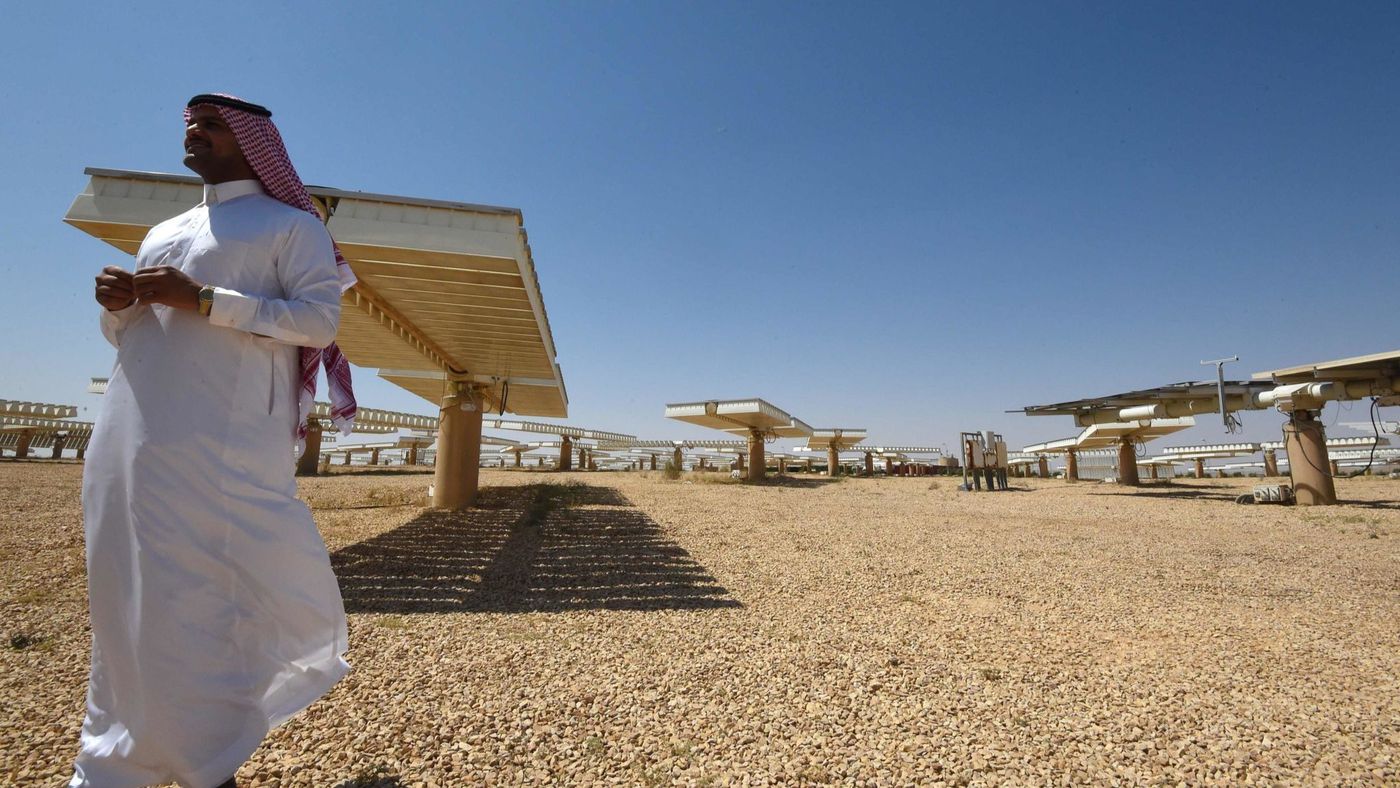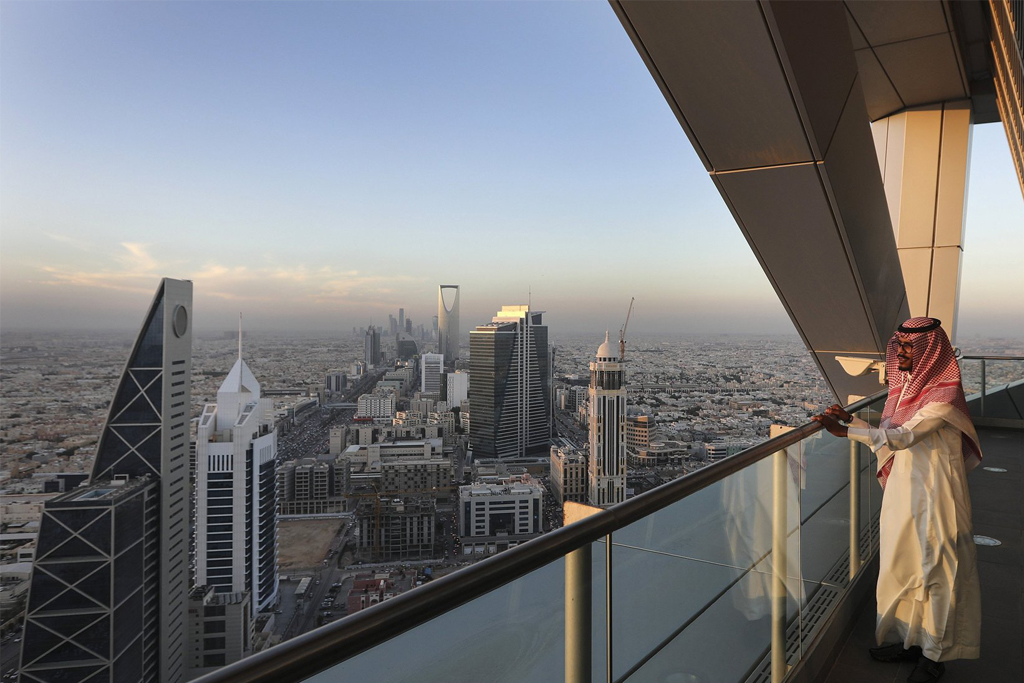If Saudi Arabia can reduce the amount of oil it burns for electricity, it will have more of its biggest source of revenue for export.

by Alexandra Zavis | May 31, 2018

Ever since a team of American geologists discovered oil in the Saudi Arabian desert 80 years ago, the kingdom’s vast crude reserves, estimated at one-fifth of the world’s total, have been the primary engine of its economic growth — and a major source of its international clout.
During a recent swing across the United States, Crown Prince Mohammed bin Salman signed a $200-billion deal with Japan’s SoftBank conglomerate to build solar parks in his kingdom that can produce 200 gigawatts of electricity by 2030. That is a staggering figure, equivalent to roughly half the world’s entire solar capacity at the end of 2017.
Although the agreement was not binding, it signaled the intention of the world’s largest oil exporter to not only diversify its energy mix but also become a force in the growing market for clean power.
Whether Saudi Arabia can achieve its goals remains to be seen. Investors, though, see plenty of potential. “The kingdom has great sunshine, great size of available land and great engineers, great neighbors, but most importantly, the best and greatest vision,” SoftBank’s chief executive, Masayoshi Son, said when he announced the deal in New York at the end of March.
But Saudi leaders have announced ambitious plans to ramp up solar production before, only to back away. By the end of last year, the country had just 50 megawatts of photovoltaic systems installed — less than Kyrgyzstan or the state of Louisiana. The largest installation, a 10-megawatt array, sits atop carports at the state oil giant, Saudi Aramco. It produces enough electricity to power a nearby office tower.
Still, market analysts say there are reasons to take the Saudis seriously this time. Three years of low oil prices have produced yawning budget deficits, hurting the government’s ability to provide the public sector jobs and benefits — including cheap gas and electricity — to which its citizens have grown accustomed. Although recent subsidy cuts and the imposition of new taxes and fees have helped reduce the budget gap, growth has slowed dramatically, and unemployment remains a concern.
The push for more renewable energy is part of a broad strategy led by the country’s 32-year-old crown prince to wean the economy off oil exports and create meaningful jobs for the hundreds of thousands of young people entering the workforce each year. The government has also been investing in other sectors, including entertainment and technology, and has announced plans to sell a 5% stake in Aramco to create the world’s largest sovereign wealth fund.
“Oil is not going to be with us forever, and we need to produce other engines of growth,” said Amin Shibani, office director for the minister of energy, industry and mineral resources, Khalid Falih.
Moreover, Shibani said, the demand for electricity has surged by about 7% a year over the past decade, the product of a growing population, a construction boom and heavily subsidized prices that in effect encouraged people to indulge in comforts such as air conditioning. The country’s growing cities and industries are also heavily reliant on desalination for their water supplies, an energy-draining process.
Almost all of that electricity is currently produced by burning oil and natural gas. But rapid declines in the cost of solar and wind generation have made renewable energy an increasingly attractive alternative, even for one of the world’s biggest producers of fossil fuels. “It’s a price thing,” said Jenny Chase, an analyst at Bloomberg New Energy Finance. “Finally the price of solar electricity has come down to the extent that it’s probably cheaper to generate from solar than from oil.”
If Saudi Arabia can reduce the amount of oil it burns for electricity, it will have more of its biggest source of revenue for export. Although consumption levels have declined since the country started slashing energy subsidies in 2016, the country is still burning about 450,000 barrels of crude a day to meet its needs, according to figures compiled by the Joint Oil Data Initiative in Riyadh. If that fuel were sold abroad, it could add about $11 billion in annual revenue, at current prices.
Saudi officials set an initial target of generating 9.5 gigawatts of renewable energy by 2023, most of it solar, with some wind as well. A new office, with staff drawn from Aramco, was set up within the Ministry of Energy, Industry and Mineral Resources in January last year to advance the process.
In February, it awarded the kingdom’s first utility-scale solar project to ACWA Power, a Saudi energy company. The 300-megawatt plant, which will be built in the Sakaka area in the north, is expected to create about 400 jobs and will generate enough electricity to power about 30,000 homes. The project was awarded through a competitive bidding process, under which companies agreed to shoulder the upfront costs, about $300 million, in return for a guarantee that the government would purchase the power they produce for 25 years. At just over 2.3 cents per kilowatt-hour of electricity, the winning bid was one of two that broke the record for the lowest price submitted at an auction.
Saudi authorities rejected the lower bid, however, raising some questions about how the selection was made. Shibani said the rival bid did not comply with all the terms set for the auction.
“We love low prices, but we cannot compromise the integrity of the process,” he said.
Concerns were also raised about a requirement that companies agree to spend 30% of their upfront costs on domestic suppliers, a figure that is expected to rise in subsequent bidding rounds. But that supply chain does not currently exist, and solar manufacturers might be reluctant to open factories in Saudi Arabia until there are more plants to supply.
Shibani, though, said there were factories already in existence that could be adapted to the purpose. He also suggested that manufacturers could use the kingdom as a base to export their products to other countries in the Middle East and Africa. “We don’t intend to intervene or force marriages between companies,” he said. “But we will try to help in terms of connecting the dots.”
The ministry’s Renewable Energy Project Development Office has announced plans to issue tenders this year for eight more renewable projects — seven solar installations and a wind farm — with a combined capacity of 4.125 gigawatts. Although there is great interest in these tenders, the memorandum of understanding reached with SoftBank has injected a degree of uncertainty into the market, said Benjamin Attia, an analyst for GTM Research. It includes plans to establish a new electricity company in Saudi Arabia that will seek to commission by 2019 two solar plants with a combined capacity of 7.2 gigawatts. No details were provided about the procurement mechanism, however. If investors think they might get a better return under the SoftBank program, they might not participate in the other tenders, Attia said.
According to an outline of the agreement provided by the Saudi Embassy in Washington, there is also discussion between the parties about manufacturing solar panels and developing battery systems to store the excess energy they produce during daylight hours, so it can be used at night. Ultimately, the embassy said, the aim is to export solar power and panels abroad.
Some analysts were skeptical about the promise to deliver 200 gigawatts of solar capacity and create 100,000 jobs by 2030. Both SoftBank and the Saudis have announced lofty targets in the past, which were later scaled back. The more modest plans outlined in the deal’s first phase, however, were generally viewed as more concrete and attainable.
“Even if just that happens, and nothing else of that 200 gigawatts gets built, that still drastically changes the trajectory of the Saudi solar market,” Attia said. “The solar industry generally has been watching the Saudi market expectantly for a long time, and now we’re finally ready to say the market is taking off.”




